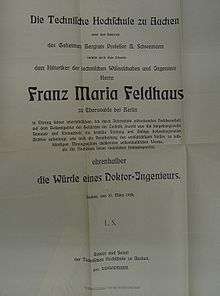Franz Maria Feldhaus

Franz Maria Feldhaus (Neuss, 26 April 1874 - Wilhelmshaven, 22 May 1957) was a German engineer and historians of science and scientific writer.[1][2] He was known in the late 1950s as "Germany's well-known and most prolific writer on the history of technology."[3]
Biography
Born in Neuss as son of a pharmacist, Feldhaus studied electrical engineering without receiving his degree. Later on the occasion of his 50th birthday in 1924 he was awarded an honorary doctorate by the RWTH Aachen in recognition of his accomplishments in the field of the history of science. In 1928 he was elected full member of the French "Académie d'Histoire des Sciences."
Late 1890s Feldhaus started to work as inventor and doing odd jobs, while starting to be interested in the history of science. In his Mannheim Workshop for Precision Mechanics he described himself as engineer - this term at that time still unprotected. In 1900 he gave up his practical activities and worked henceforth as historian of science and freelance writer.[4]
Feldhaus later attended lectures by Theodor Beck (1839-1917) in Darmstadt, who had published on the history of engineering. After his death in 1917 he inherited his estate and research in the field. Over the years Feldhaus built up without any government support an archive on the history of engineering, which became one of the largest private archives in Germany.[4] In Heidelberg and later in Berlin Feldhaus built a private institute, entitled "Quellenforschungen zur Geschichte der Technik und der Naturwissenschaften" (Source research on the history of engineering and natural science) in 1909. He also founded the company Historia-Foto GmbH, which might have been the first commercial image archive in Germany. Immediately after the Second World War in 1945-46 Feldhaus was appointed Director of the National Museum in Neustrelitz. The last years of his life he lived in Wilhelmshaven.
In 1959 Feldhaus posthumously received the Rudolf-Diesel-Medaille from the German Institute for Inventions. The poet and novelist Eva Zeller (born 1923) is one of Feldhaus' daughters.
Work
Lexikon der Erfindungen und Entdeckungen, 1904
Feldhaus' first publication was the Lexikon der Erfindungen und Entdeckungen, (Dictionary of inventions and discoveries) in 1904, which gave a timeline of inventions and discoveries in the fields of science and technology. This work was designed as reference, and not for educational purposes.[5]
Institute for research in the history of engineering, natural science and industry, 1909/19
In 1909 Feldhaus founded the "Quellenforschungen zur Geschichte der Technik und Naturwissenschaften" Institute[6] In 1919 this institute was turned into the Gmbh "Quellenforschungen zur Geschichte der Technik und Industrie," and since 1927 "Geschichte der Technik, e.V.".[7]
The History of Technical Drawing, 1960-63
Feldhaus' "Geschichte des technischen Zeichnens" is translated into English and published in 1960-63 as "The History of Technical Drawing." The work started with the words:
- "From the time man began to think, invent and actively create, he has endeavored to express his thoughts pictorially, both for his own assistance and to make himself understood by others..."[8]
The article commented, that "herein is the essence of graphics. The passing centuries have brought about new concepts and improvement in methods; nevertheless industry's need for the pictorial communicator will remain. Industry will continue looking for graduates equipped with a thorough understanding of graphic principles and with the skill required to execute neat and accurate drawings."[9]
Selected publications
- Lexikon der Erfindungen und Entdeckungen: Auf den Gebieten der Naturwissenschaften und Technik. 1904.
- Feldhaus' Buch der Erfindungen. Unterhaltende Belehrungen aus der Geschichte der Technik, Oestergaard, Berlin 1907.
- Ruhmesblätter der technik von den urerfindungen bis zur gegenwart (1910)
- Die Technik der Vorzeit, der geschichtlichen Zeit und der Naturvölker. Ein Handbuch für Archäologen und Historiker, Museen und Sammler, Kunsthändler und Antiquare, Engelmann, Leipzig und Berlin 1914. Reprint 1971.
- Modernste Kriegswaffen --alte Erfindungen (1915)
- Die Kinderschuhe der neuen Verkehrsmittel, Leipzig 1927.
- Kulturgeschichte der Technik I und II, 1928. Reprint 1980.
- Die Technik der Antike und des Mittelalters, Athenaion, Potsdam 1931. Reprint 1971.
- Männer deutscher Tat, Steinhaus, München, wahrscheinlich 1934.
- Der Weg in die Technik. Ein Buch zum Schauen und Denken, Leipzig 1935.
- Geschichte des technischen Zeichnens. 1953. 2nd enlarged edition, edited by E. Schruff, Wilhelmshaven 1959.
References
- ↑ Hans-Erhard Lessing: Franz Maria Feldhaus. Kann man von Technikgeschichte leben?. In: Peter Blum (Hrsg.): Pioniere aus Technik und Wirtschaft in Heidelberg. Shaker, Aachen 2000, ISBN 3-8265-6544-4, S. 80–93
- ↑ Marcus Popplow: Franz Maria Feldhaus. Die Weltgeschichte der Technik auf Karteikarten. In: cut und paste um 1900 (= Kaleidoskopien 2002; H. 4), S. 100–114
- ↑ R. S. Hartenberg. "Geschichte des Technischen Zeichnens by Franz Maria Feldhaus; Edmund Schruff." in: Technology and Culture Vol. 2, No. 1 (Winter, 1961), pp. 45-49
- 1 2 Redaktion (1961), "Feldhaus, Franz Maria", Neue Deutsche Biographie (NDB) (in German), 5, Berlin: Duncker & Humblot, p. 68; (full text online)
- ↑ Feldhaus (1904, p. v)
- ↑ Burkhard Dietz (1996). Technische Intelligenz und "Kulturfaktor Technik". p. 138.
- ↑ Wolfgang König (ed.). Die technikhistorische Forschung in Deutschland von 1800 bis zur Gegenwart, 2007, p. 50
- ↑ Feldhaus, cited in: American Society for Engineering Education (ASEE), Proceedings. Vol. 68 (1961), p. 724.
- ↑ ASEE 1961, p. 724.)
External links
-
 Works related to de:Franz Maria Feldhaus at Wikisource
Works related to de:Franz Maria Feldhaus at Wikisource